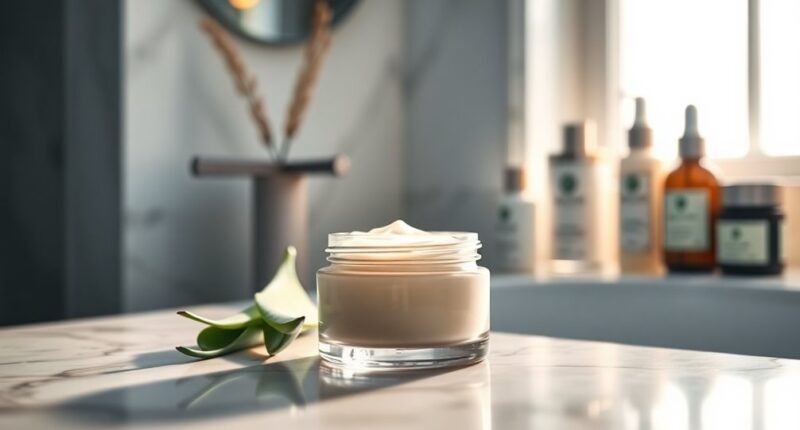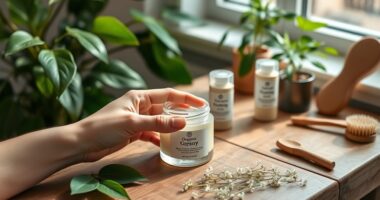To effectively treat dark circles, focus on lifestyle changes like staying hydrated, getting enough sleep, and eating a balanced diet. Use topical treatments like eye creams containing hyaluronic acid, vitamin C, and caffeine to brighten and tighten the skin. For advanced solutions, consider chemical peels, fillers, or laser treatments to improve skin texture and reduce hollowness. Consulting a dermatologist can help you create a personalized plan that suits your needs. Let’s explore more options that could work for you!
Key Takeaways
- Stay hydrated and ensure adequate sleep to significantly reduce dark circles and improve skin health.
- Incorporate a balanced diet rich in nutrients to support skin vitality and reduce pigmentation.
- Use topical treatments like eye creams with hyaluronic acid, vitamin C, and caffeine for effective results.
- Consider advanced solutions such as filler injections or laser treatments for long-lasting improvements.
- Consult a dermatologist for personalized care and tailored treatment plans to effectively address dark circles.

If you’ve ever looked in the mirror and noticed dark circles under your eyes, you’re not alone; many people struggle with this issue. These pesky marks can stem from various factors like genetics, lack of sleep, chronic rubbing, and even exposure to UV rays.
Many people face the common issue of dark circles under their eyes, influenced by genetics, sleep deprivation, and UV exposure.
It’s essential to recognize that dark circles aren’t solely an age-related concern—they can appear at any stage of life and affect your appearance and self-confidence. In fact, dark circles are often attributed to periorbital hyperpigmentation from excess melanin production.
To tackle this problem, start by making some lifestyle changes. Staying hydrated is crucial; drinking plenty of water helps maintain healthy skin. Additionally, ensure you’re getting enough sleep, as rest plays a significant role in reducing dark circles.
A balanced diet rich in nutrients also supports your skin health. Don’t forget to establish a consistent skin care routine and protect your skin from UV rays, which can exacerbate the issue.
When lifestyle adjustments aren’t enough, consider topical treatments. Eye creams containing active ingredients like hyaluronic acid, vitamin C, and caffeine can yield effective results. Cold compresses can also help by constricting blood vessels, reducing puffiness.
Eye gel masks and vitamins K and C can calm the area and improve blood vessel health.
For more advanced solutions, chemical peels can stimulate healing by sloughing off the top layers of skin. This not only improves texture but allows anti-aging treatments to penetrate more deeply.
Filler injections, such as Restylane or Juvederm, can puff up the skin and reduce hollowness, and these procedures typically require minimal downtime. Laser treatments are another option, using pulses of light to boost collagen production, effectively improving skin texture and reducing signs of aging.
Ultimately, a combination of lifestyle changes and targeted treatments can significantly help you minimize the appearance of dark circles. Don’t hesitate to consult with a dermatologist to find the best plan tailored to your needs.
Frequently Asked Questions
Are Dark Circles Hereditary or Can They Develop Over Time?
Dark circles can indeed be hereditary, often influenced by your family history and genetics. If someone in your family has them, you might notice the same issue.
However, they can also develop over time due to factors like aging, lifestyle changes, or environmental influences. Stress, sleep patterns, and certain health conditions play a role too.
Can Allergies Cause Dark Circles Under the Eyes?
Allergies can really lead to dark circles under your eyes? Absolutely! When allergies strike, they can cause increased blood flow and inflammation in the under-eye area, making those circles more pronounced.
Rubbing your eyes due to itching only worsens the issue, damaging delicate skin. Plus, fluid accumulation from allergic reactions contributes to puffiness.
Managing your allergies is key; avoiding triggers and keeping the area moisturized can help reduce those pesky dark circles.
Is There a Specific Age When Dark Circles Typically Appear?
Dark circles typically become noticeable in your mid-to-late 30s and 40s.
As you age, the loss of fat and collagen around your eyes contributes to their prominence. Skin thinning allows blood vessels beneath to show through, making dark circles more apparent.
While genetics can play a role, factors like fatigue and allergies also affect their appearance.
Keeping an eye on your lifestyle choices can help manage their development as you age.
Do Certain Lifestyle Habits Worsen Dark Circles?
Yes, certain lifestyle habits can definitely worsen dark circles.
If you’re not getting enough sleep or have irregular sleep patterns, it can lead to fluid retention and increased visibility of dark circles.
Poor hydration, excessive caffeine, and high salt intake can also contribute.
Additionally, smoking, drinking alcohol, and prolonged screen time can strain your eyes and dehydrate your skin, making those dark circles even more prominent.
Taking care of these habits can help improve your appearance.
How Can Diet Impact the Appearance of Dark Circles?
Your diet plays a crucial role in the appearance of dark circles.
If you’re lacking essential nutrients like iron or antioxidants, you might notice more pronounced circles. Consuming anti-inflammatory foods and staying hydrated can help improve your skin’s health.
On the flip side, sugary snacks, processed foods, and excessive caffeine can worsen inflammation and dehydration.
Conclusion
Just as a garden flourishes with the right care, so can your under-eyes with the right treatments. By nurturing your skin with hydration, sunscreen, and targeted products, you cultivate a brighter, more vibrant appearance. Remember, every bloom takes time to flourish, so be patient and consistent. Embrace your unique beauty, and soon those dark circles will be mere shadows in your garden of self-care. After all, even the sun needs to rise each day to shine its best.









